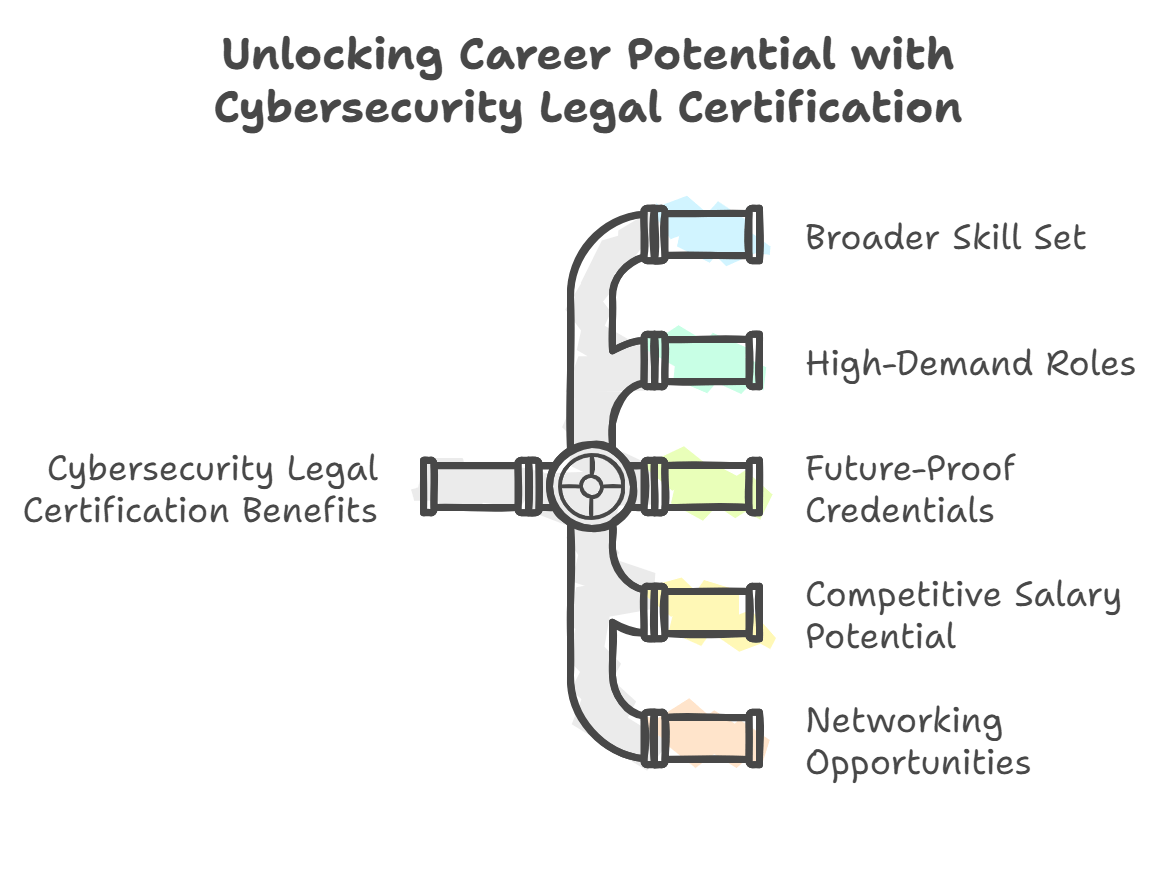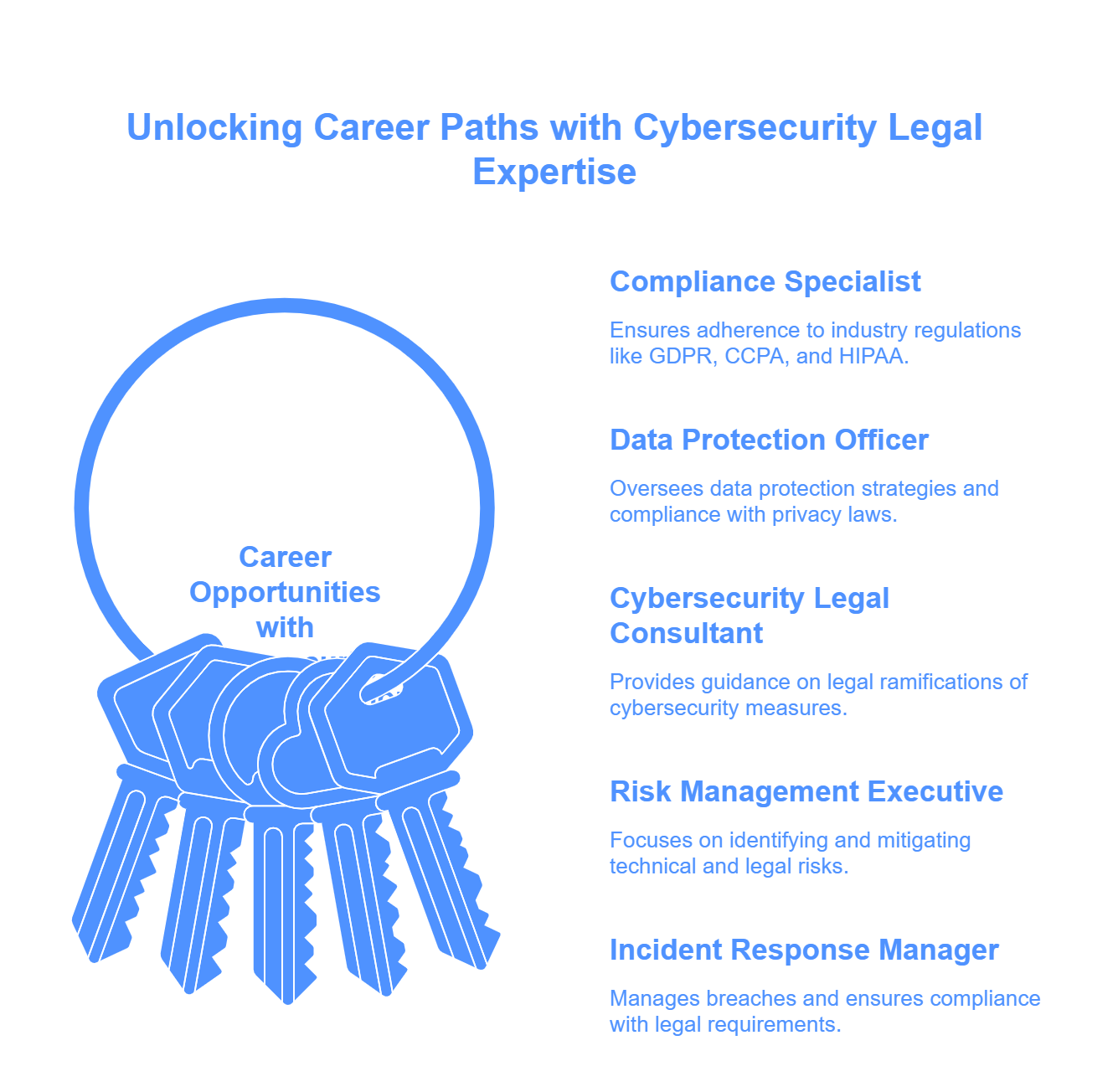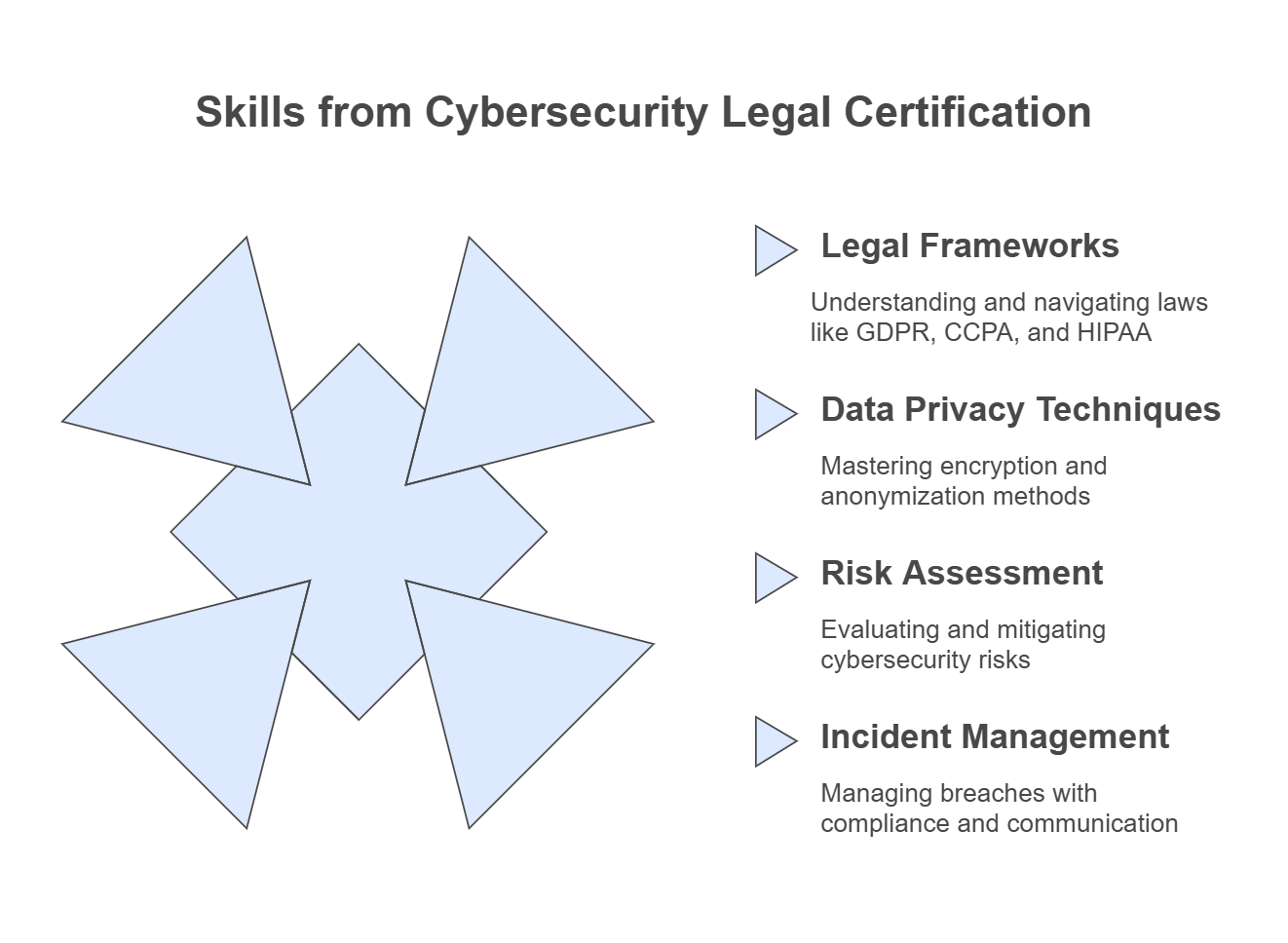Table of Contents
- Why Cybersecurity Legal Certification Matters
- The Rising Importance of Cybersecurity Law
- Career Advantages of Cybersecurity Legal Certification
- Career Opportunities with Cybersecurity Legal Certification
- Key Skills You Gain from a Cybersecurity Legal Certification
- Pairing Your Certification with ACSMI’s Advanced Modules
- Final Thoughts
- FAQs on Cybersecurity Legal Certification
The world of cybersecurity continues to evolve at a rapid pace, and as businesses become more reliant on technology, they also face an increasing number of cyber threats. In this digital age, organizations must protect sensitive data and ensure compliance with various legal frameworks, making professionals who specialize in cybersecurity and legal compliance more valuable than ever. A Cybersecurity Law Certification in 2025 equips you with the expertise to navigate both the technical and regulatory aspects of cybersecurity, allowing you to protect organizations from legal and technological risks.
Why Cybersecurity Legal Certification Matters
Cybersecurity is no longer just a technical issue; it’s a legal and compliance issue too. With the rise of cybercrime, data breaches, and strict regulations, organizations need professionals who not only understand security technologies but also the legal implications of failing to secure their systems. As cyber threats become more sophisticated, it’s essential for businesses to have experts who can ensure compliance with legal frameworks such as GDPR, CCPA, and HIPAA, while also addressing potential cybersecurity threats.
A cybersecurity legal certification provides the dual expertise required to address both technical and legal challenges. By earning this credential, you’ll become proficient in ensuring that your organization’s cybersecurity measures align with regulatory requirements, thus mitigating the risk of legal liabilities.
The Rising Importance of Cybersecurity Law
The growing number of cyber incidents such as data breaches, ransomware attacks, and non-compliance penalties has raised the importance of cybersecurity laws. Organizations face the daunting task of not only implementing technical measures to protect their systems but also ensuring compliance with industry regulations.
Cybersecurity Law Certification Online provides professionals with the expertise to interpret and apply evolving regulatory standards, craft and execute compliance strategies and ensure data privacy protection. As regulations continue to evolve, particularly in light of emerging technologies like AI governance and blockchain legislation, the demand for certified professionals who can manage both technical and legal aspects will only grow.
Career Advantages of Cybersecurity Legal Certification
Holding a cybersecurity legal certification comes with numerous career benefits that can position you as a leader in this niche field.

1. Broader Skill Set
The combination of legal and technical expertise enables you to bridge the gap between IT and legal departments. By understanding both the technical and compliance aspects of cybersecurity, you become a versatile asset to any organization.
2. High-Demand Roles
The rise of cybersecurity-related legal frameworks has led to increased job opportunities. Industries like finance, healthcare, and technology are actively hiring cybersecurity legal experts who can help navigate regulatory challenges and safeguard sensitive data.
3. Future-Proof Credentials
As cybersecurity laws evolve, certifications like these provide you with future-proof knowledge. They equip you to stay ahead of compliance requirements and emerging threats, keeping you indispensable to organizations.
4. Competitive Salary Potential
Due to the unique skill set and expertise required, professionals holding a cybersecurity legal certification can command higher salaries. Combining legal and cybersecurity knowledge positions you for top-paying roles in various industries.
5. Networking Opportunities
Certification programs often provide networking opportunities with other professionals in the field. This access to peers and mentors can help expand your career prospects and knowledge base.
Career Opportunities with Cybersecurity Legal Certification
Earning a cybersecurity legal certification opens up a wealth of career opportunities, as the intersection between cybersecurity and law is critical to organizations' operational stability and security. Here are some key roles you can pursue:

1. Compliance Specialist
A compliance specialist is responsible for ensuring that an organization adheres to industry regulations like GDPR, CCPA, and HIPAA. They set up policies and frameworks to guarantee that cybersecurity practices align with these legal requirements.
2. Data Protection Officer (DPO)
The DPO oversees the data protection strategies within an organization, ensuring that data privacy laws are followed. This role is especially crucial for businesses handling sensitive personal information or working in regulated industries.
3. Cybersecurity Legal Consultant
Cybersecurity legal consultants provide guidance to organizations, helping them understand the legal ramifications of their cybersecurity measures. They advise on how to align security practices with legal obligations and ensure compliance with relevant laws.
4. Risk Management Executive
Risk management executives focus on identifying, assessing, and mitigating risks from both a technical and legal perspective. Their role ensures that organizations are prepared for potential threats and comply with regulatory standards.
5. Incident Response Manager
An incident response manager handles breaches by managing both technical recovery efforts and legal documentation. They ensure that the organization follows legal requirements for breach notifications and minimizes legal and reputational damage.
Key Skills You Gain from a Cybersecurity Legal Certification
A cybersecurity legal certification equips you with the necessary skills to understand and implement the intersection of technology and law. Here’s a deeper look at the critical skills you’ll gain:

1. Comprehensive Understanding of Legal Frameworks
A core benefit of the certification is learning how to navigate the laws and regulations that govern cybersecurity. You’ll gain expertise in:
-
GDPR: Ensuring the protection of EU citizens’ personal data by complying with stringent consent, data collection, and breach notification regulations.
-
CCPA: Understanding data-sharing laws and ensuring that organizations handle consumer rights appropriately.
-
HIPAA: Protecting patient data and ensuring compliance with healthcare industry regulations.
These legal frameworks will form the backbone of your cybersecurity strategies.
2. Mastery in Data Privacy and Encryption Techniques
Data privacy is at the heart of cybersecurity, and legal compliance requires encryption and privacy-by-design practices. You’ll learn:
-
Data Encryption: How to encrypt data at rest, in use, and in transit to prevent unauthorized access.
-
Data Anonymization: Techniques to anonymize data while ensuring it remains useful for analysis.
-
Access Control: Implementing multi-factor authentication and other robust security measures to control access.
These skills help ensure that data is protected in compliance with laws, mitigating legal risks.
3. Risk Assessment and Mitigation Strategies
Cybersecurity legal certification teaches you how to identify risks, evaluate consequences, and design mitigation plans that address both technological and legal vulnerabilities. Key areas include:
-
Compliance Gap Analysis: Evaluating an organization’s cybersecurity policies for potential legal vulnerabilities.
-
Risk Prioritization: Identifying risks based on their severity and likelihood, and taking action to minimize exposure.
-
Holistic Mitigation Plans: Crafting solutions that integrate technical safeguards with legal policy updates.
This skill is critical for ensuring organizations meet legal requirements while securing their assets.
4. Incident and Breach Management Excellence
Effective incident response is vital for managing breaches. A cybersecurity legal certification teaches you:
-
Incident Investigation and Root Cause Analysis: Investigating breaches to identify their causes and implement corrective measures.
-
Legal Compliance in Breach Response: Ensuring that breaches are reported to regulatory bodies in a timely and compliant manner.
-
Communication Strategy Development: Crafting communication plans to maintain trust with stakeholders and clients.
These skills help you handle incidents efficiently while ensuring compliance with legal requirements.
Pairing Your Certification with ACSMI’s Advanced Modules
While a cybersecurity legal certification provides foundational expertise, pairing it with additional training opportunities can elevate your skills further. ACSMI certifications offer over 400 modules that provide advanced training in critical areas like:
-
Advanced Technical Skills: Learn malware analysis, penetration testing, and other hands-on technical skills.
-
Regulatory Framework Expertise: Gain deeper insights into complex regulations and cross-border laws.
-
Emerging Technologies: Prepare for the future with AI-enabled threat detection, quantum-safe cryptography, and other cutting-edge technologies.
-
Forensics and Incident Handling: Master cybersecurity forensics, an essential skill for managing breaches and creating legally admissible evidence.
ACSMI certifications complement your cybersecurity legal certification by providing technical skills and insights that allow you to lead in both legal and technical domains.
Final Thoughts
Earning a cybersecurity legal certification combines two critical areas—cybersecurity and legal compliance. As regulations grow to address new and emerging technologies, and as organizations evolve their risk strategies, the need for certified professionals with this hybrid expertise continues to rise. Pairing your cybersecurity legal certification with ACSMI’s advanced training ensures you stay ahead of evolving threats and regulatory challenges. By doing so, you position yourself as a leader in an ever-growing and highly impactful field. Take the next step in your career and invest in cybersecurity legal certification today!
FAQs on Cybersecurity Legal Certification
What is cybersecurity legal certification?
It’s a credential that validates your expertise in both cybersecurity measures and legal frameworks, such as GDPR, CCPA, and HIPAA, ensuring compliance and security.
Who should pursue cybersecurity legal certification?
Cybersecurity professionals, lawyers, compliance officers, and IT managers seeking to expand their expertise should pursue this certification.
How long does it take to obtain certification?
Most certifications take 3 to 6 months to complete, depending on the program and individual pace.
Are there hands-on components in these certifications?
Yes, most programs, including ACSMI certifications, feature simulations and practical exercises for incident management and compliance strategies.
Can I pair this certification with other credentials?
Absolutely! Combining it with technical certifications such as those from ACSMI gives you a comprehensive skill set to handle both legal and technical challenges.

Leave a Reply